Dissertation: Managing Changes in Healthcare for Quality Services
VerifiedAdded on 2020/06/06
|40
|14133
|39
Thesis and Dissertation
AI Summary
This dissertation investigates the significance of change management within the National Health Service (NHS) to improve the delivery of quality healthcare services. The study examines the importance of change management, its effectiveness in enhancing service quality, and its impact on patient care. It identifies various barriers that healthcare organizations face during change implementation and proposes strategies for successful change management within the NHS context. The research includes a literature review, detailed methodology encompassing research philosophy, design, and data collection methods, followed by findings and analysis. The dissertation concludes with a discussion of the results, recommendations for future improvements, and references, aiming to provide a comprehensive understanding of change management's role in healthcare settings. The structure includes an abstract, introduction outlining the study's background, aims, objectives, and limitations, followed by chapters dedicated to literature review, methodology, findings, and discussion.

DISSERTATION
Paraphrase This Document
Need a fresh take? Get an instant paraphrase of this document with our AI Paraphraser
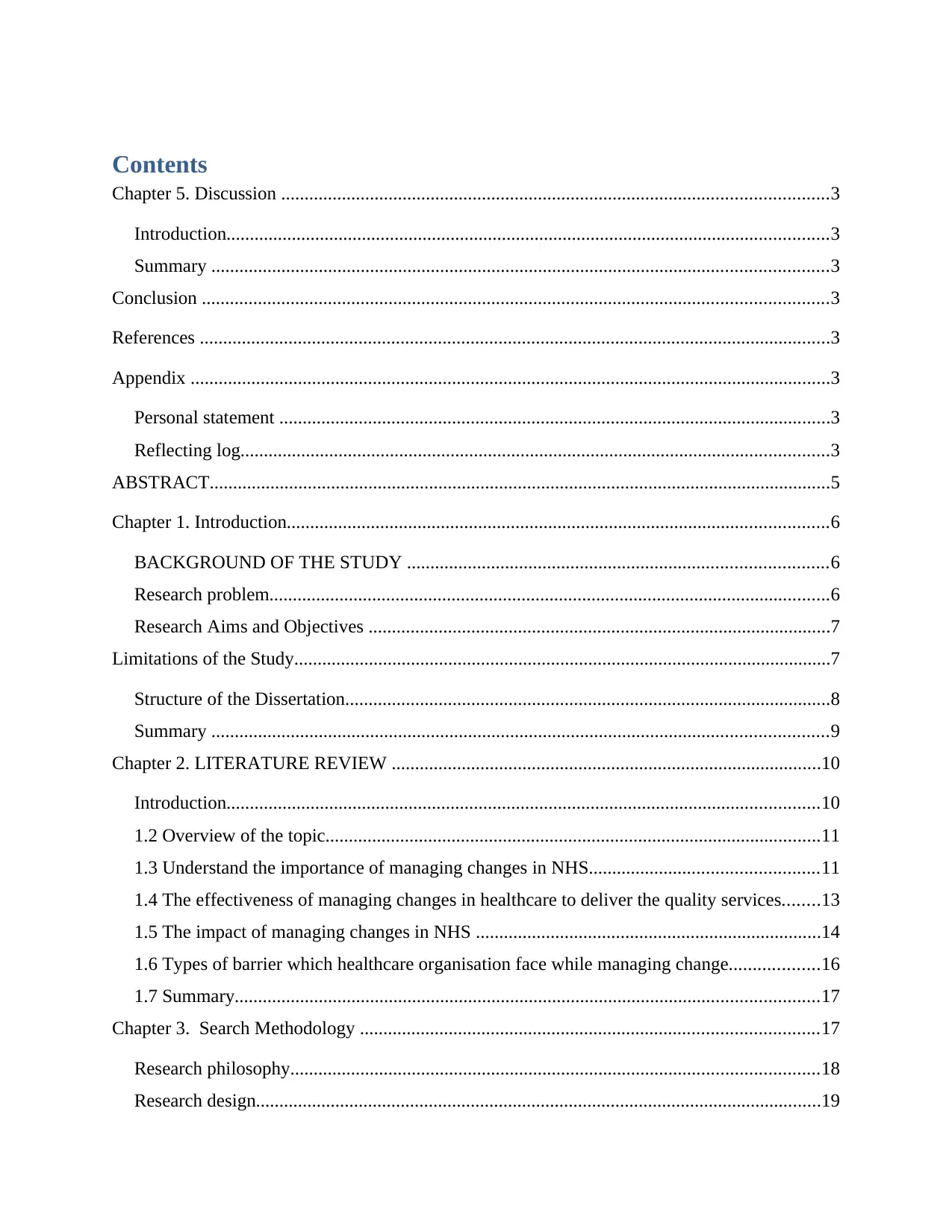
Contents
Chapter 5. Discussion .....................................................................................................................3
Introduction.................................................................................................................................3
Summary ....................................................................................................................................3
Conclusion ......................................................................................................................................3
References .......................................................................................................................................3
Appendix .........................................................................................................................................3
Personal statement ......................................................................................................................3
Reflecting log..............................................................................................................................3
ABSTRACT.....................................................................................................................................5
Chapter 1. Introduction....................................................................................................................6
BACKGROUND OF THE STUDY ..........................................................................................6
Research problem........................................................................................................................6
Research Aims and Objectives ...................................................................................................7
Limitations of the Study...................................................................................................................7
Structure of the Dissertation........................................................................................................8
Summary ....................................................................................................................................9
Chapter 2. LITERATURE REVIEW ............................................................................................10
Introduction...............................................................................................................................10
1.2 Overview of the topic..........................................................................................................11
1.3 Understand the importance of managing changes in NHS.................................................11
1.4 The effectiveness of managing changes in healthcare to deliver the quality services........13
1.5 The impact of managing changes in NHS ..........................................................................14
1.6 Types of barrier which healthcare organisation face while managing change...................16
1.7 Summary.............................................................................................................................17
Chapter 3. Search Methodology ..................................................................................................17
Research philosophy.................................................................................................................18
Research design.........................................................................................................................19
Chapter 5. Discussion .....................................................................................................................3
Introduction.................................................................................................................................3
Summary ....................................................................................................................................3
Conclusion ......................................................................................................................................3
References .......................................................................................................................................3
Appendix .........................................................................................................................................3
Personal statement ......................................................................................................................3
Reflecting log..............................................................................................................................3
ABSTRACT.....................................................................................................................................5
Chapter 1. Introduction....................................................................................................................6
BACKGROUND OF THE STUDY ..........................................................................................6
Research problem........................................................................................................................6
Research Aims and Objectives ...................................................................................................7
Limitations of the Study...................................................................................................................7
Structure of the Dissertation........................................................................................................8
Summary ....................................................................................................................................9
Chapter 2. LITERATURE REVIEW ............................................................................................10
Introduction...............................................................................................................................10
1.2 Overview of the topic..........................................................................................................11
1.3 Understand the importance of managing changes in NHS.................................................11
1.4 The effectiveness of managing changes in healthcare to deliver the quality services........13
1.5 The impact of managing changes in NHS ..........................................................................14
1.6 Types of barrier which healthcare organisation face while managing change...................16
1.7 Summary.............................................................................................................................17
Chapter 3. Search Methodology ..................................................................................................17
Research philosophy.................................................................................................................18
Research design.........................................................................................................................19
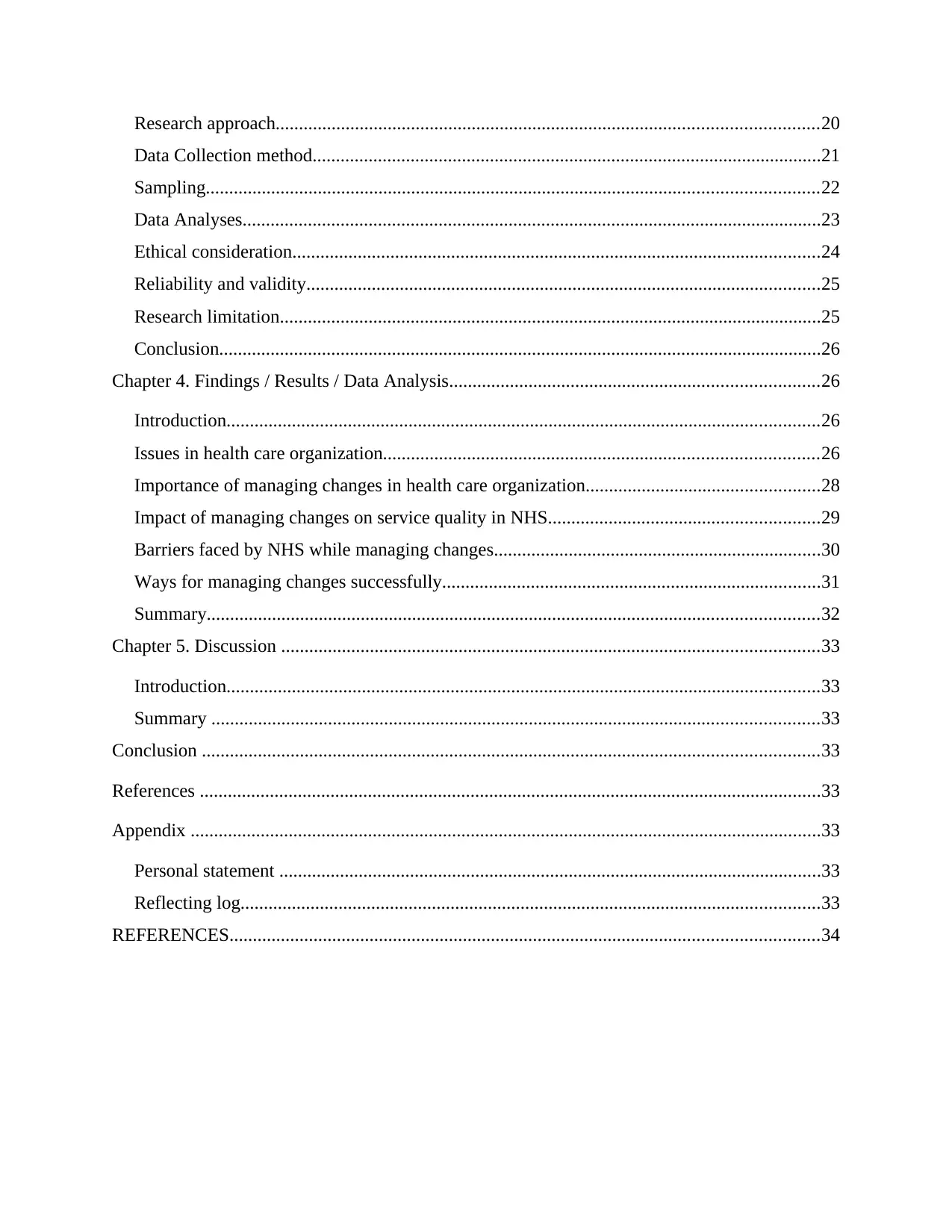
Research approach....................................................................................................................20
Data Collection method.............................................................................................................21
Sampling...................................................................................................................................22
Data Analyses............................................................................................................................23
Ethical consideration.................................................................................................................24
Reliability and validity..............................................................................................................25
Research limitation....................................................................................................................25
Conclusion.................................................................................................................................26
Chapter 4. Findings / Results / Data Analysis...............................................................................26
Introduction...............................................................................................................................26
Issues in health care organization.............................................................................................26
Importance of managing changes in health care organization..................................................28
Impact of managing changes on service quality in NHS..........................................................29
Barriers faced by NHS while managing changes......................................................................30
Ways for managing changes successfully.................................................................................31
Summary...................................................................................................................................32
Chapter 5. Discussion ...................................................................................................................33
Introduction...............................................................................................................................33
Summary ..................................................................................................................................33
Conclusion ....................................................................................................................................33
References .....................................................................................................................................33
Appendix .......................................................................................................................................33
Personal statement ....................................................................................................................33
Reflecting log............................................................................................................................33
REFERENCES..............................................................................................................................34
Data Collection method.............................................................................................................21
Sampling...................................................................................................................................22
Data Analyses............................................................................................................................23
Ethical consideration.................................................................................................................24
Reliability and validity..............................................................................................................25
Research limitation....................................................................................................................25
Conclusion.................................................................................................................................26
Chapter 4. Findings / Results / Data Analysis...............................................................................26
Introduction...............................................................................................................................26
Issues in health care organization.............................................................................................26
Importance of managing changes in health care organization..................................................28
Impact of managing changes on service quality in NHS..........................................................29
Barriers faced by NHS while managing changes......................................................................30
Ways for managing changes successfully.................................................................................31
Summary...................................................................................................................................32
Chapter 5. Discussion ...................................................................................................................33
Introduction...............................................................................................................................33
Summary ..................................................................................................................................33
Conclusion ....................................................................................................................................33
References .....................................................................................................................................33
Appendix .......................................................................................................................................33
Personal statement ....................................................................................................................33
Reflecting log............................................................................................................................33
REFERENCES..............................................................................................................................34
⊘ This is a preview!⊘
Do you want full access?
Subscribe today to unlock all pages.

Trusted by 1+ million students worldwide
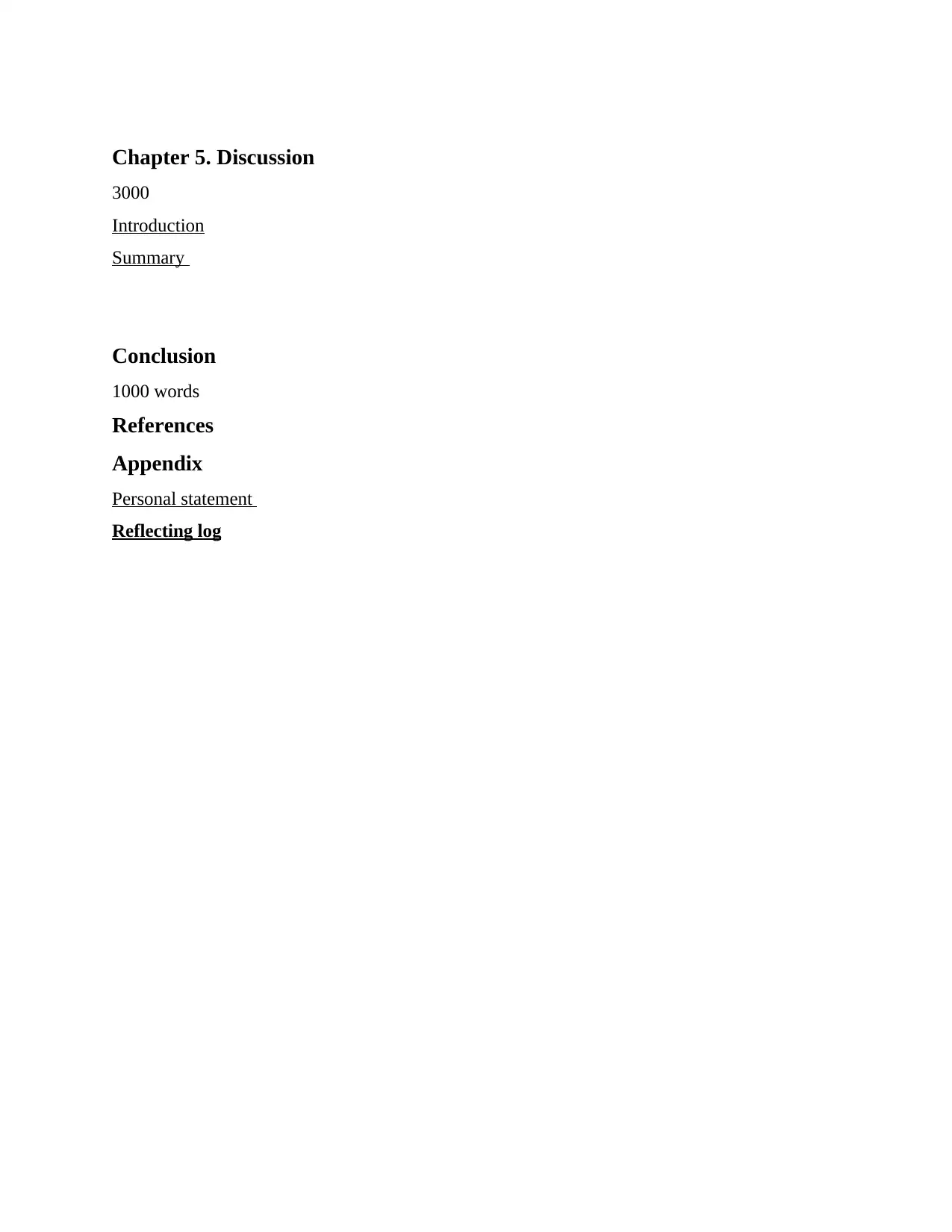
Chapter 5. Discussion
3000
Introduction
Summary
Conclusion
1000 words
References
Appendix
Personal statement
Reflecting log
3000
Introduction
Summary
Conclusion
1000 words
References
Appendix
Personal statement
Reflecting log
Paraphrase This Document
Need a fresh take? Get an instant paraphrase of this document with our AI Paraphraser

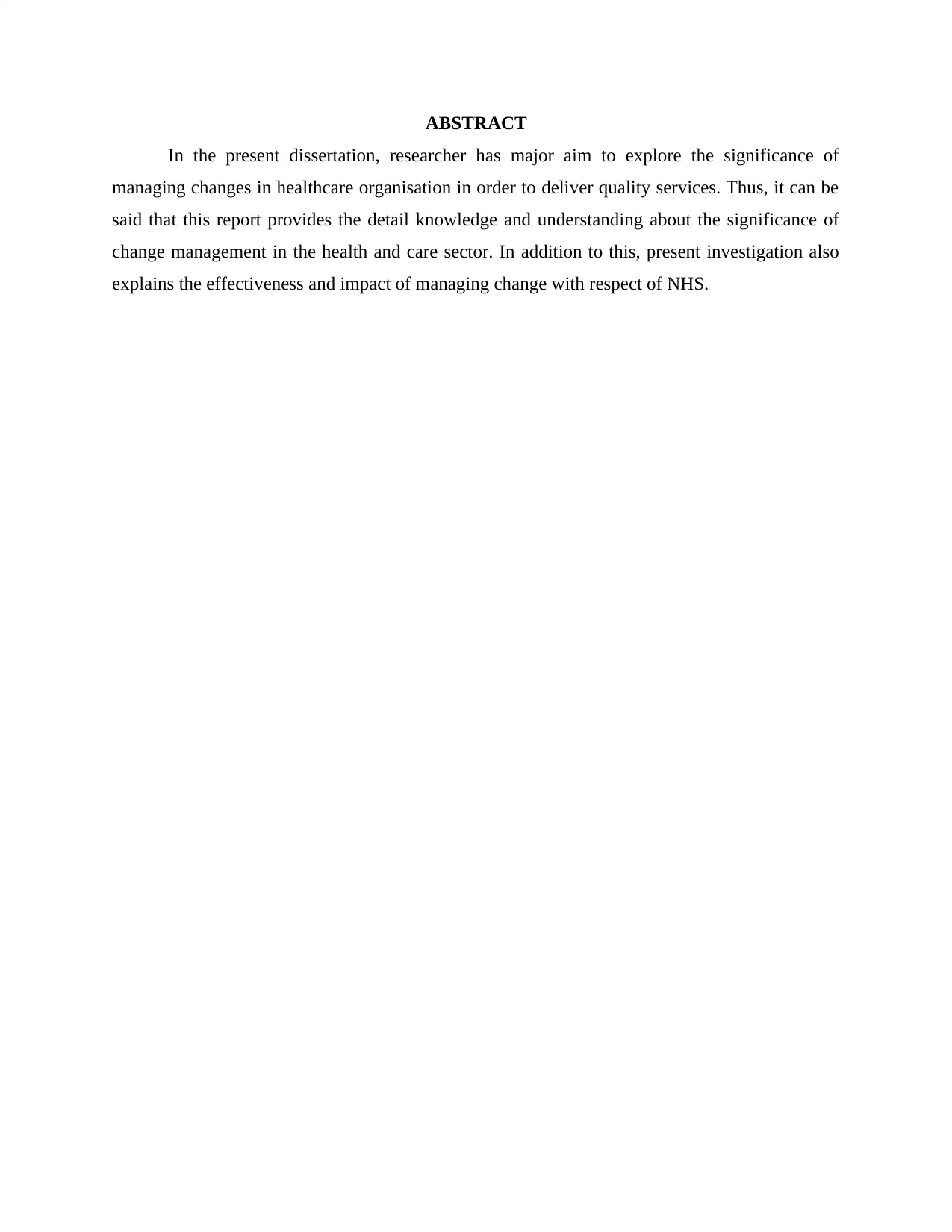
ABSTRACT
In the present dissertation, researcher has major aim to explore the significance of
managing changes in healthcare organisation in order to deliver quality services. Thus, it can be
said that this report provides the detail knowledge and understanding about the significance of
change management in the health and care sector. In addition to this, present investigation also
explains the effectiveness and impact of managing change with respect of NHS.
In the present dissertation, researcher has major aim to explore the significance of
managing changes in healthcare organisation in order to deliver quality services. Thus, it can be
said that this report provides the detail knowledge and understanding about the significance of
change management in the health and care sector. In addition to this, present investigation also
explains the effectiveness and impact of managing change with respect of NHS.
⊘ This is a preview!⊘
Do you want full access?
Subscribe today to unlock all pages.

Trusted by 1+ million students worldwide
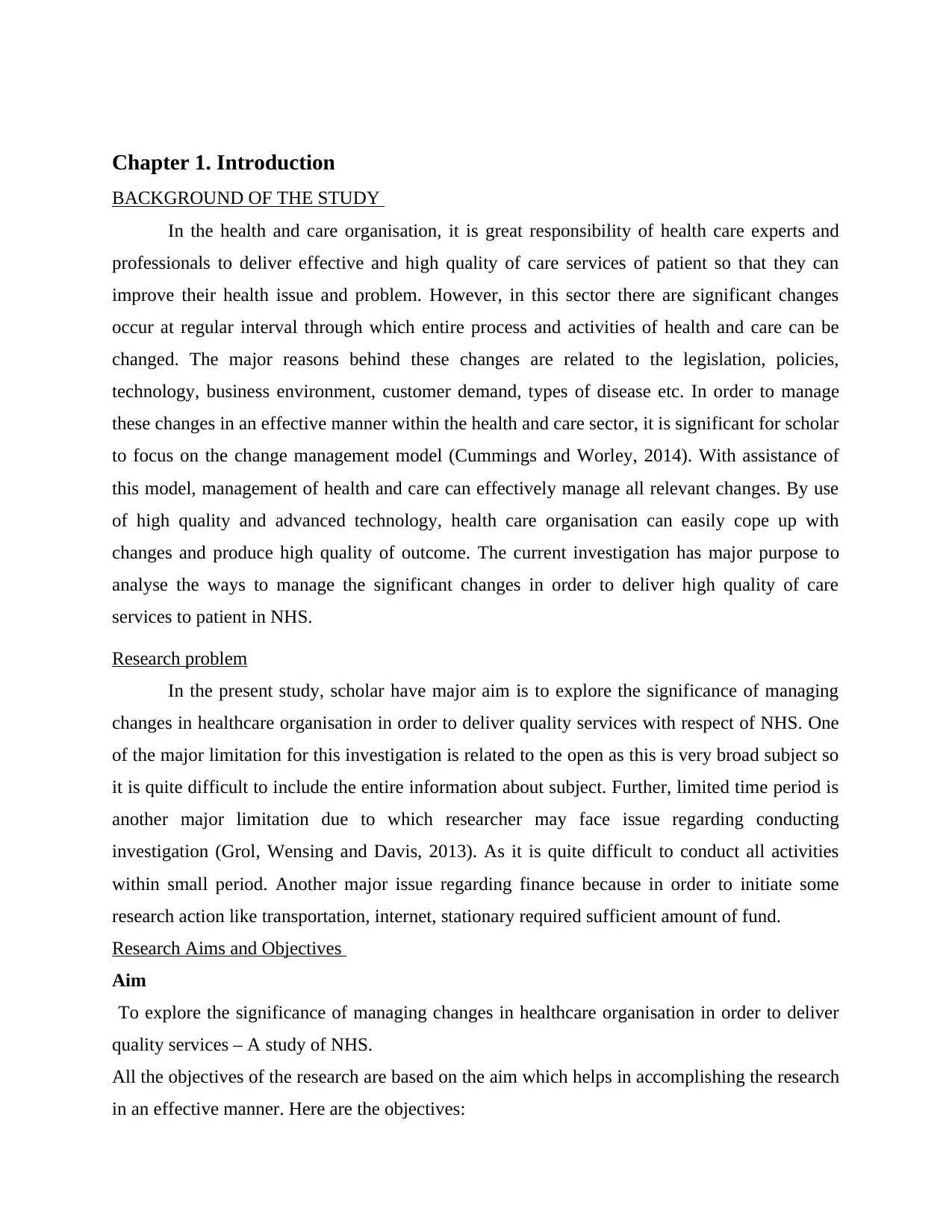
Chapter 1. Introduction
BACKGROUND OF THE STUDY
In the health and care organisation, it is great responsibility of health care experts and
professionals to deliver effective and high quality of care services of patient so that they can
improve their health issue and problem. However, in this sector there are significant changes
occur at regular interval through which entire process and activities of health and care can be
changed. The major reasons behind these changes are related to the legislation, policies,
technology, business environment, customer demand, types of disease etc. In order to manage
these changes in an effective manner within the health and care sector, it is significant for scholar
to focus on the change management model (Cummings and Worley, 2014). With assistance of
this model, management of health and care can effectively manage all relevant changes. By use
of high quality and advanced technology, health care organisation can easily cope up with
changes and produce high quality of outcome. The current investigation has major purpose to
analyse the ways to manage the significant changes in order to deliver high quality of care
services to patient in NHS.
Research problem
In the present study, scholar have major aim is to explore the significance of managing
changes in healthcare organisation in order to deliver quality services with respect of NHS. One
of the major limitation for this investigation is related to the open as this is very broad subject so
it is quite difficult to include the entire information about subject. Further, limited time period is
another major limitation due to which researcher may face issue regarding conducting
investigation (Grol, Wensing and Davis, 2013). As it is quite difficult to conduct all activities
within small period. Another major issue regarding finance because in order to initiate some
research action like transportation, internet, stationary required sufficient amount of fund.
Research Aims and Objectives
Aim
To explore the significance of managing changes in healthcare organisation in order to deliver
quality services – A study of NHS.
All the objectives of the research are based on the aim which helps in accomplishing the research
in an effective manner. Here are the objectives:
BACKGROUND OF THE STUDY
In the health and care organisation, it is great responsibility of health care experts and
professionals to deliver effective and high quality of care services of patient so that they can
improve their health issue and problem. However, in this sector there are significant changes
occur at regular interval through which entire process and activities of health and care can be
changed. The major reasons behind these changes are related to the legislation, policies,
technology, business environment, customer demand, types of disease etc. In order to manage
these changes in an effective manner within the health and care sector, it is significant for scholar
to focus on the change management model (Cummings and Worley, 2014). With assistance of
this model, management of health and care can effectively manage all relevant changes. By use
of high quality and advanced technology, health care organisation can easily cope up with
changes and produce high quality of outcome. The current investigation has major purpose to
analyse the ways to manage the significant changes in order to deliver high quality of care
services to patient in NHS.
Research problem
In the present study, scholar have major aim is to explore the significance of managing
changes in healthcare organisation in order to deliver quality services with respect of NHS. One
of the major limitation for this investigation is related to the open as this is very broad subject so
it is quite difficult to include the entire information about subject. Further, limited time period is
another major limitation due to which researcher may face issue regarding conducting
investigation (Grol, Wensing and Davis, 2013). As it is quite difficult to conduct all activities
within small period. Another major issue regarding finance because in order to initiate some
research action like transportation, internet, stationary required sufficient amount of fund.
Research Aims and Objectives
Aim
To explore the significance of managing changes in healthcare organisation in order to deliver
quality services – A study of NHS.
All the objectives of the research are based on the aim which helps in accomplishing the research
in an effective manner. Here are the objectives:
Paraphrase This Document
Need a fresh take? Get an instant paraphrase of this document with our AI Paraphraser
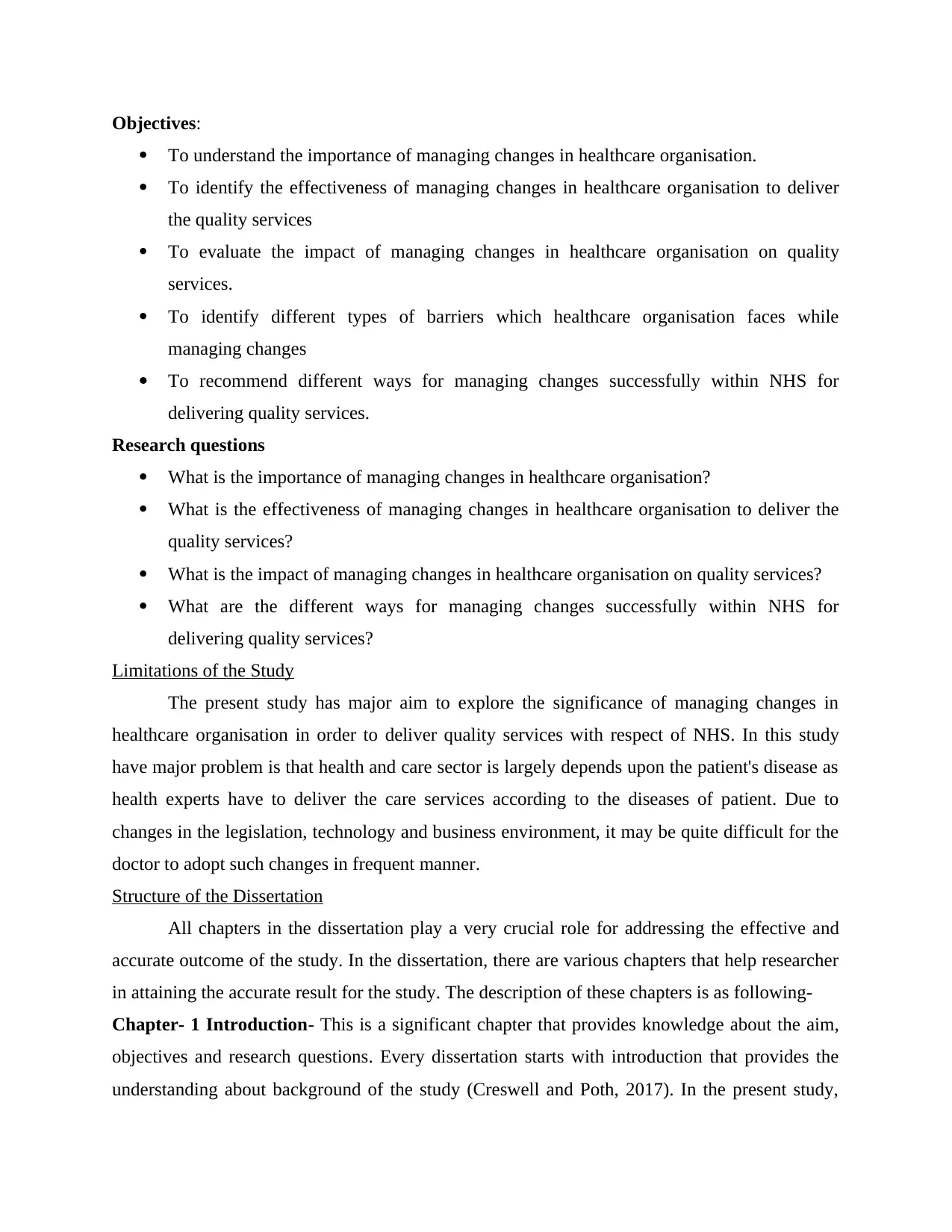
Objectives:
To understand the importance of managing changes in healthcare organisation.
To identify the effectiveness of managing changes in healthcare organisation to deliver
the quality services
To evaluate the impact of managing changes in healthcare organisation on quality
services.
To identify different types of barriers which healthcare organisation faces while
managing changes
To recommend different ways for managing changes successfully within NHS for
delivering quality services.
Research questions
What is the importance of managing changes in healthcare organisation?
What is the effectiveness of managing changes in healthcare organisation to deliver the
quality services?
What is the impact of managing changes in healthcare organisation on quality services?
What are the different ways for managing changes successfully within NHS for
delivering quality services?
Limitations of the Study
The present study has major aim to explore the significance of managing changes in
healthcare organisation in order to deliver quality services with respect of NHS. In this study
have major problem is that health and care sector is largely depends upon the patient's disease as
health experts have to deliver the care services according to the diseases of patient. Due to
changes in the legislation, technology and business environment, it may be quite difficult for the
doctor to adopt such changes in frequent manner.
Structure of the Dissertation
All chapters in the dissertation play a very crucial role for addressing the effective and
accurate outcome of the study. In the dissertation, there are various chapters that help researcher
in attaining the accurate result for the study. The description of these chapters is as following-
Chapter- 1 Introduction- This is a significant chapter that provides knowledge about the aim,
objectives and research questions. Every dissertation starts with introduction that provides the
understanding about background of the study (Creswell and Poth, 2017). In the present study,
To understand the importance of managing changes in healthcare organisation.
To identify the effectiveness of managing changes in healthcare organisation to deliver
the quality services
To evaluate the impact of managing changes in healthcare organisation on quality
services.
To identify different types of barriers which healthcare organisation faces while
managing changes
To recommend different ways for managing changes successfully within NHS for
delivering quality services.
Research questions
What is the importance of managing changes in healthcare organisation?
What is the effectiveness of managing changes in healthcare organisation to deliver the
quality services?
What is the impact of managing changes in healthcare organisation on quality services?
What are the different ways for managing changes successfully within NHS for
delivering quality services?
Limitations of the Study
The present study has major aim to explore the significance of managing changes in
healthcare organisation in order to deliver quality services with respect of NHS. In this study
have major problem is that health and care sector is largely depends upon the patient's disease as
health experts have to deliver the care services according to the diseases of patient. Due to
changes in the legislation, technology and business environment, it may be quite difficult for the
doctor to adopt such changes in frequent manner.
Structure of the Dissertation
All chapters in the dissertation play a very crucial role for addressing the effective and
accurate outcome of the study. In the dissertation, there are various chapters that help researcher
in attaining the accurate result for the study. The description of these chapters is as following-
Chapter- 1 Introduction- This is a significant chapter that provides knowledge about the aim,
objectives and research questions. Every dissertation starts with introduction that provides the
understanding about background of the study (Creswell and Poth, 2017). In the present study,
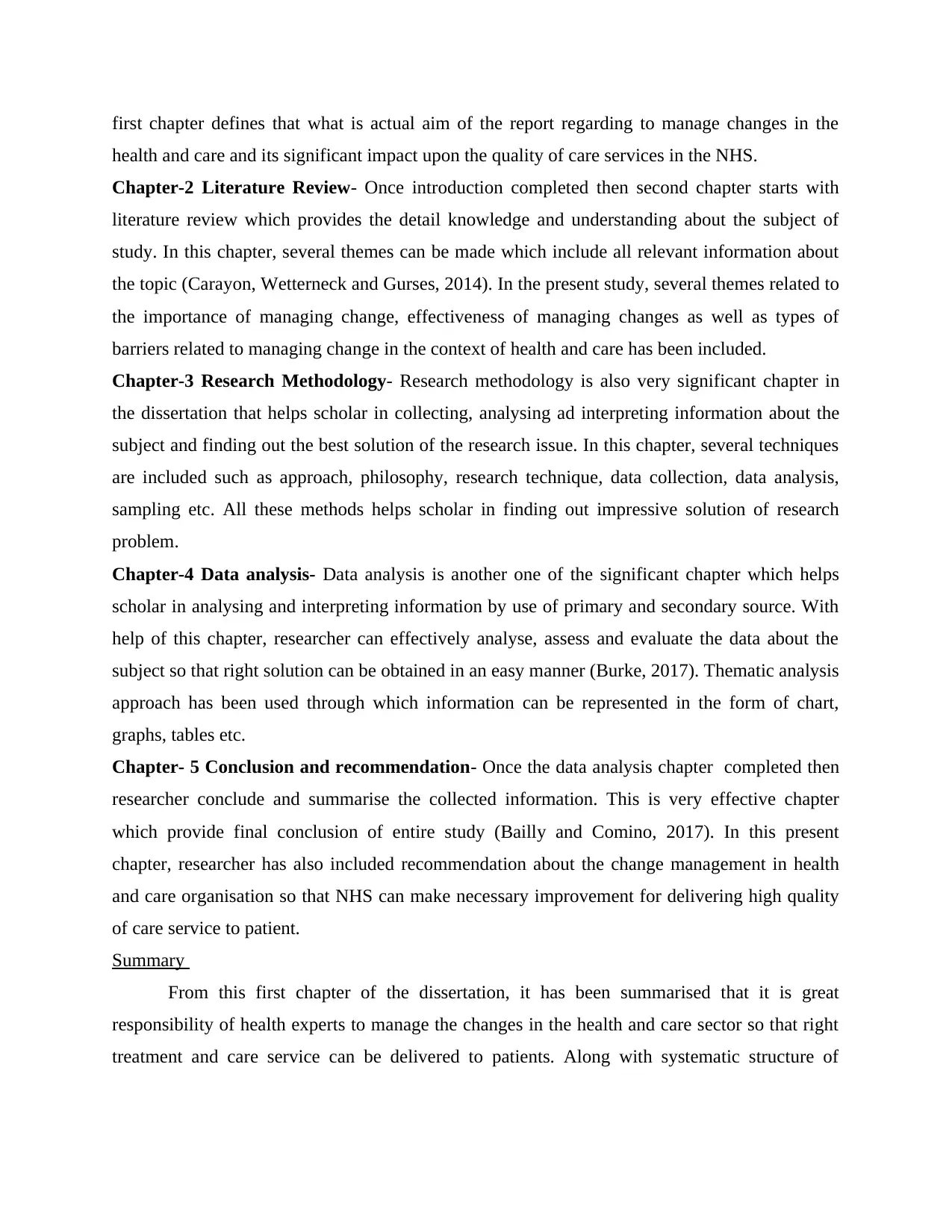
first chapter defines that what is actual aim of the report regarding to manage changes in the
health and care and its significant impact upon the quality of care services in the NHS.
Chapter-2 Literature Review- Once introduction completed then second chapter starts with
literature review which provides the detail knowledge and understanding about the subject of
study. In this chapter, several themes can be made which include all relevant information about
the topic (Carayon, Wetterneck and Gurses, 2014). In the present study, several themes related to
the importance of managing change, effectiveness of managing changes as well as types of
barriers related to managing change in the context of health and care has been included.
Chapter-3 Research Methodology- Research methodology is also very significant chapter in
the dissertation that helps scholar in collecting, analysing ad interpreting information about the
subject and finding out the best solution of the research issue. In this chapter, several techniques
are included such as approach, philosophy, research technique, data collection, data analysis,
sampling etc. All these methods helps scholar in finding out impressive solution of research
problem.
Chapter-4 Data analysis- Data analysis is another one of the significant chapter which helps
scholar in analysing and interpreting information by use of primary and secondary source. With
help of this chapter, researcher can effectively analyse, assess and evaluate the data about the
subject so that right solution can be obtained in an easy manner (Burke, 2017). Thematic analysis
approach has been used through which information can be represented in the form of chart,
graphs, tables etc.
Chapter- 5 Conclusion and recommendation- Once the data analysis chapter completed then
researcher conclude and summarise the collected information. This is very effective chapter
which provide final conclusion of entire study (Bailly and Comino, 2017). In this present
chapter, researcher has also included recommendation about the change management in health
and care organisation so that NHS can make necessary improvement for delivering high quality
of care service to patient.
Summary
From this first chapter of the dissertation, it has been summarised that it is great
responsibility of health experts to manage the changes in the health and care sector so that right
treatment and care service can be delivered to patients. Along with systematic structure of
health and care and its significant impact upon the quality of care services in the NHS.
Chapter-2 Literature Review- Once introduction completed then second chapter starts with
literature review which provides the detail knowledge and understanding about the subject of
study. In this chapter, several themes can be made which include all relevant information about
the topic (Carayon, Wetterneck and Gurses, 2014). In the present study, several themes related to
the importance of managing change, effectiveness of managing changes as well as types of
barriers related to managing change in the context of health and care has been included.
Chapter-3 Research Methodology- Research methodology is also very significant chapter in
the dissertation that helps scholar in collecting, analysing ad interpreting information about the
subject and finding out the best solution of the research issue. In this chapter, several techniques
are included such as approach, philosophy, research technique, data collection, data analysis,
sampling etc. All these methods helps scholar in finding out impressive solution of research
problem.
Chapter-4 Data analysis- Data analysis is another one of the significant chapter which helps
scholar in analysing and interpreting information by use of primary and secondary source. With
help of this chapter, researcher can effectively analyse, assess and evaluate the data about the
subject so that right solution can be obtained in an easy manner (Burke, 2017). Thematic analysis
approach has been used through which information can be represented in the form of chart,
graphs, tables etc.
Chapter- 5 Conclusion and recommendation- Once the data analysis chapter completed then
researcher conclude and summarise the collected information. This is very effective chapter
which provide final conclusion of entire study (Bailly and Comino, 2017). In this present
chapter, researcher has also included recommendation about the change management in health
and care organisation so that NHS can make necessary improvement for delivering high quality
of care service to patient.
Summary
From this first chapter of the dissertation, it has been summarised that it is great
responsibility of health experts to manage the changes in the health and care sector so that right
treatment and care service can be delivered to patients. Along with systematic structure of
⊘ This is a preview!⊘
Do you want full access?
Subscribe today to unlock all pages.

Trusted by 1+ million students worldwide
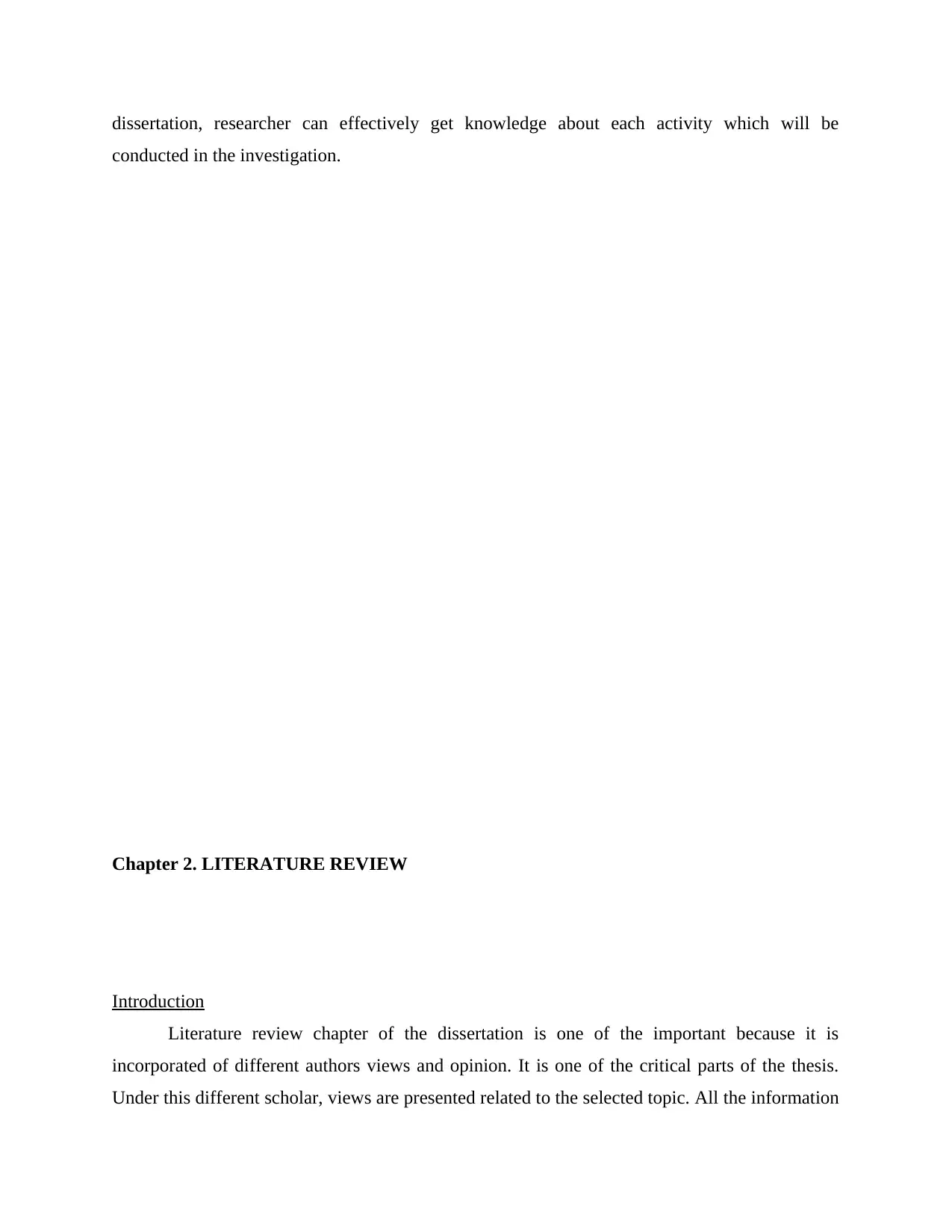
dissertation, researcher can effectively get knowledge about each activity which will be
conducted in the investigation.
Chapter 2. LITERATURE REVIEW
Introduction
Literature review chapter of the dissertation is one of the important because it is
incorporated of different authors views and opinion. It is one of the critical parts of the thesis.
Under this different scholar, views are presented related to the selected topic. All the information
conducted in the investigation.
Chapter 2. LITERATURE REVIEW
Introduction
Literature review chapter of the dissertation is one of the important because it is
incorporated of different authors views and opinion. It is one of the critical parts of the thesis.
Under this different scholar, views are presented related to the selected topic. All the information
Paraphrase This Document
Need a fresh take? Get an instant paraphrase of this document with our AI Paraphraser
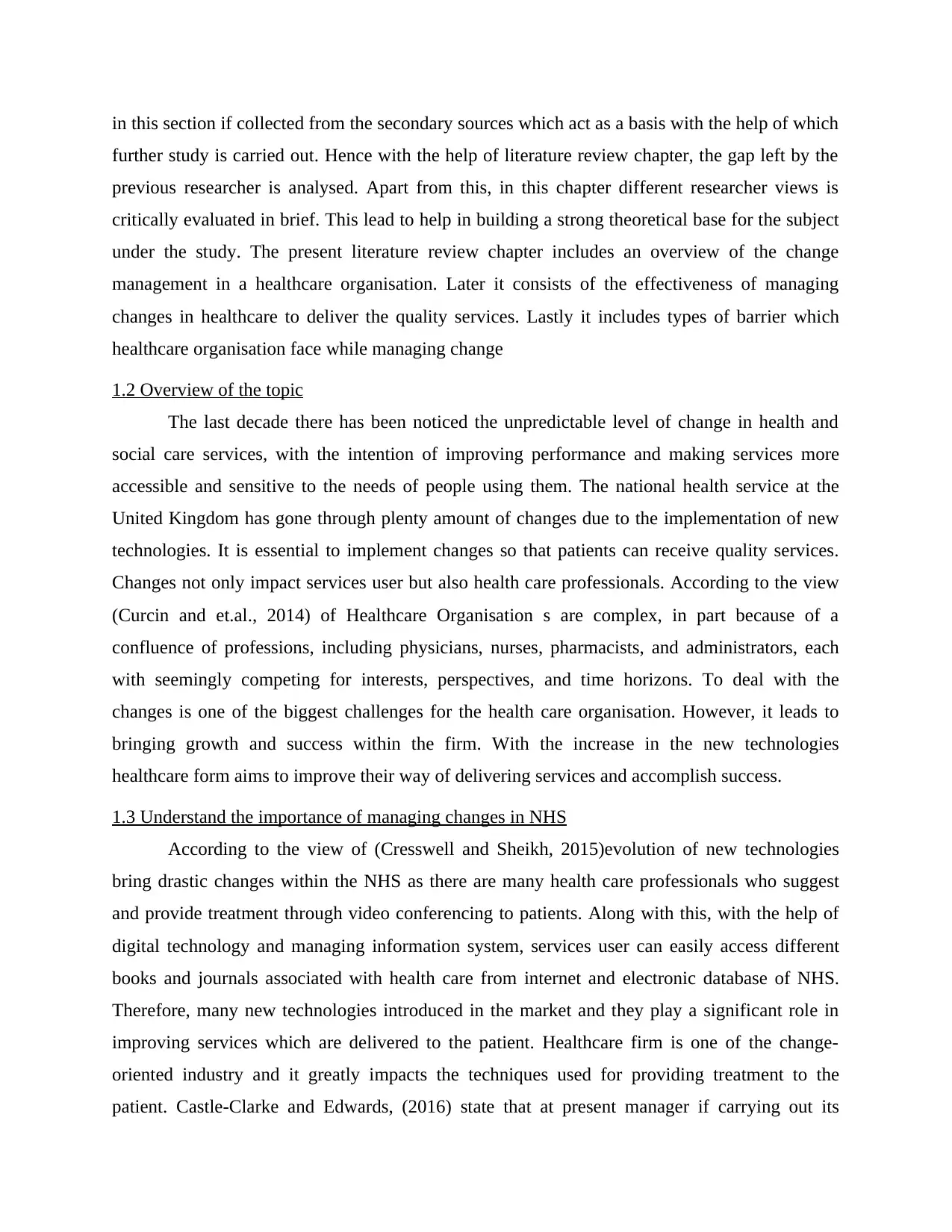
in this section if collected from the secondary sources which act as a basis with the help of which
further study is carried out. Hence with the help of literature review chapter, the gap left by the
previous researcher is analysed. Apart from this, in this chapter different researcher views is
critically evaluated in brief. This lead to help in building a strong theoretical base for the subject
under the study. The present literature review chapter includes an overview of the change
management in a healthcare organisation. Later it consists of the effectiveness of managing
changes in healthcare to deliver the quality services. Lastly it includes types of barrier which
healthcare organisation face while managing change
1.2 Overview of the topic
The last decade there has been noticed the unpredictable level of change in health and
social care services, with the intention of improving performance and making services more
accessible and sensitive to the needs of people using them. The national health service at the
United Kingdom has gone through plenty amount of changes due to the implementation of new
technologies. It is essential to implement changes so that patients can receive quality services.
Changes not only impact services user but also health care professionals. According to the view
(Curcin and et.al., 2014) of Healthcare Organisation s are complex, in part because of a
confluence of professions, including physicians, nurses, pharmacists, and administrators, each
with seemingly competing for interests, perspectives, and time horizons. To deal with the
changes is one of the biggest challenges for the health care organisation. However, it leads to
bringing growth and success within the firm. With the increase in the new technologies
healthcare form aims to improve their way of delivering services and accomplish success.
1.3 Understand the importance of managing changes in NHS
According to the view of (Cresswell and Sheikh, 2015)evolution of new technologies
bring drastic changes within the NHS as there are many health care professionals who suggest
and provide treatment through video conferencing to patients. Along with this, with the help of
digital technology and managing information system, services user can easily access different
books and journals associated with health care from internet and electronic database of NHS.
Therefore, many new technologies introduced in the market and they play a significant role in
improving services which are delivered to the patient. Healthcare firm is one of the change-
oriented industry and it greatly impacts the techniques used for providing treatment to the
patient. Castle-Clarke and Edwards, (2016) state that at present manager if carrying out its
further study is carried out. Hence with the help of literature review chapter, the gap left by the
previous researcher is analysed. Apart from this, in this chapter different researcher views is
critically evaluated in brief. This lead to help in building a strong theoretical base for the subject
under the study. The present literature review chapter includes an overview of the change
management in a healthcare organisation. Later it consists of the effectiveness of managing
changes in healthcare to deliver the quality services. Lastly it includes types of barrier which
healthcare organisation face while managing change
1.2 Overview of the topic
The last decade there has been noticed the unpredictable level of change in health and
social care services, with the intention of improving performance and making services more
accessible and sensitive to the needs of people using them. The national health service at the
United Kingdom has gone through plenty amount of changes due to the implementation of new
technologies. It is essential to implement changes so that patients can receive quality services.
Changes not only impact services user but also health care professionals. According to the view
(Curcin and et.al., 2014) of Healthcare Organisation s are complex, in part because of a
confluence of professions, including physicians, nurses, pharmacists, and administrators, each
with seemingly competing for interests, perspectives, and time horizons. To deal with the
changes is one of the biggest challenges for the health care organisation. However, it leads to
bringing growth and success within the firm. With the increase in the new technologies
healthcare form aims to improve their way of delivering services and accomplish success.
1.3 Understand the importance of managing changes in NHS
According to the view of (Cresswell and Sheikh, 2015)evolution of new technologies
bring drastic changes within the NHS as there are many health care professionals who suggest
and provide treatment through video conferencing to patients. Along with this, with the help of
digital technology and managing information system, services user can easily access different
books and journals associated with health care from internet and electronic database of NHS.
Therefore, many new technologies introduced in the market and they play a significant role in
improving services which are delivered to the patient. Healthcare firm is one of the change-
oriented industry and it greatly impacts the techniques used for providing treatment to the
patient. Castle-Clarke and Edwards, (2016) state that at present manager if carrying out its
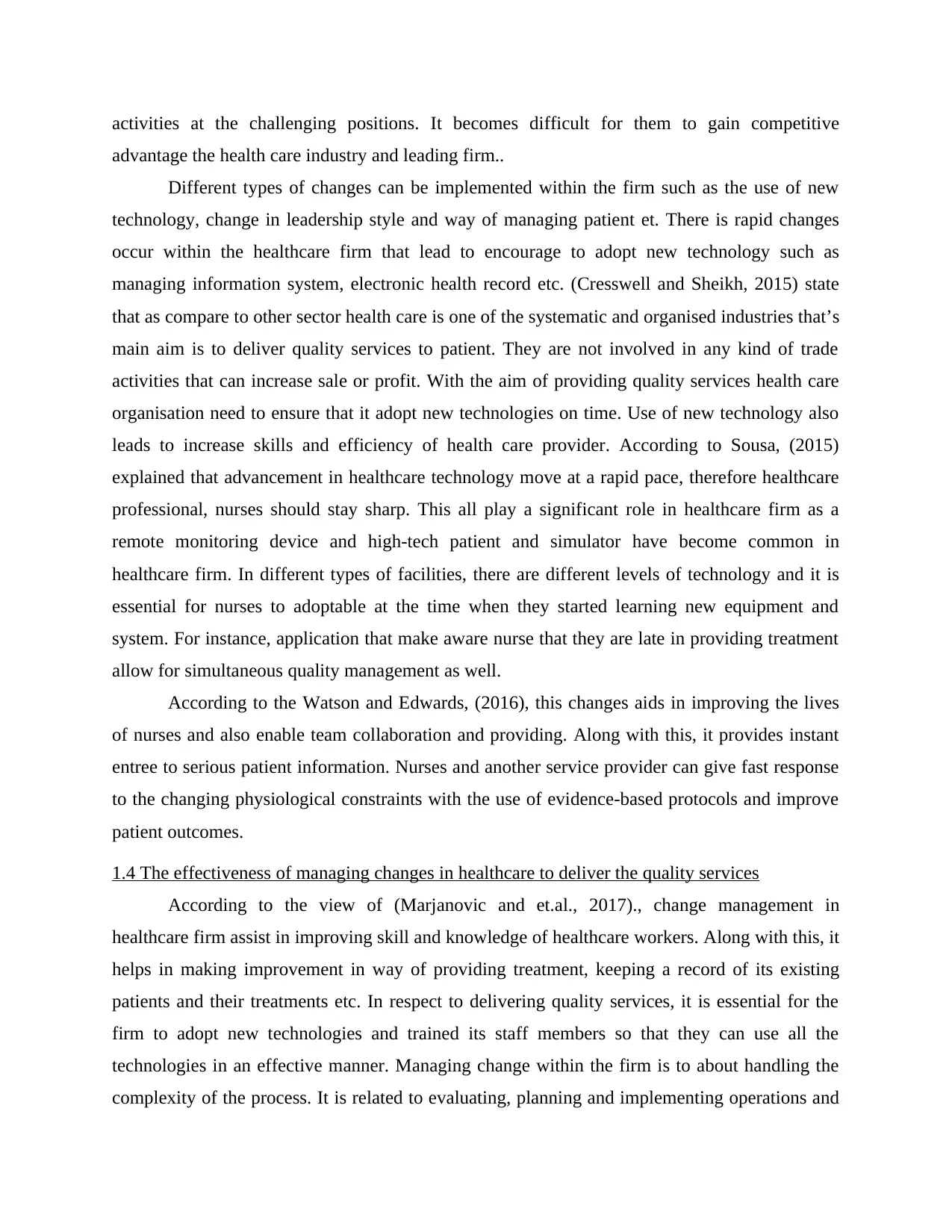
activities at the challenging positions. It becomes difficult for them to gain competitive
advantage the health care industry and leading firm..
Different types of changes can be implemented within the firm such as the use of new
technology, change in leadership style and way of managing patient et. There is rapid changes
occur within the healthcare firm that lead to encourage to adopt new technology such as
managing information system, electronic health record etc. (Cresswell and Sheikh, 2015) state
that as compare to other sector health care is one of the systematic and organised industries that’s
main aim is to deliver quality services to patient. They are not involved in any kind of trade
activities that can increase sale or profit. With the aim of providing quality services health care
organisation need to ensure that it adopt new technologies on time. Use of new technology also
leads to increase skills and efficiency of health care provider. According to Sousa, (2015)
explained that advancement in healthcare technology move at a rapid pace, therefore healthcare
professional, nurses should stay sharp. This all play a significant role in healthcare firm as a
remote monitoring device and high-tech patient and simulator have become common in
healthcare firm. In different types of facilities, there are different levels of technology and it is
essential for nurses to adoptable at the time when they started learning new equipment and
system. For instance, application that make aware nurse that they are late in providing treatment
allow for simultaneous quality management as well.
According to the Watson and Edwards, (2016), this changes aids in improving the lives
of nurses and also enable team collaboration and providing. Along with this, it provides instant
entree to serious patient information. Nurses and another service provider can give fast response
to the changing physiological constraints with the use of evidence-based protocols and improve
patient outcomes.
1.4 The effectiveness of managing changes in healthcare to deliver the quality services
According to the view of (Marjanovic and et.al., 2017)., change management in
healthcare firm assist in improving skill and knowledge of healthcare workers. Along with this, it
helps in making improvement in way of providing treatment, keeping a record of its existing
patients and their treatments etc. In respect to delivering quality services, it is essential for the
firm to adopt new technologies and trained its staff members so that they can use all the
technologies in an effective manner. Managing change within the firm is to about handling the
complexity of the process. It is related to evaluating, planning and implementing operations and
advantage the health care industry and leading firm..
Different types of changes can be implemented within the firm such as the use of new
technology, change in leadership style and way of managing patient et. There is rapid changes
occur within the healthcare firm that lead to encourage to adopt new technology such as
managing information system, electronic health record etc. (Cresswell and Sheikh, 2015) state
that as compare to other sector health care is one of the systematic and organised industries that’s
main aim is to deliver quality services to patient. They are not involved in any kind of trade
activities that can increase sale or profit. With the aim of providing quality services health care
organisation need to ensure that it adopt new technologies on time. Use of new technology also
leads to increase skills and efficiency of health care provider. According to Sousa, (2015)
explained that advancement in healthcare technology move at a rapid pace, therefore healthcare
professional, nurses should stay sharp. This all play a significant role in healthcare firm as a
remote monitoring device and high-tech patient and simulator have become common in
healthcare firm. In different types of facilities, there are different levels of technology and it is
essential for nurses to adoptable at the time when they started learning new equipment and
system. For instance, application that make aware nurse that they are late in providing treatment
allow for simultaneous quality management as well.
According to the Watson and Edwards, (2016), this changes aids in improving the lives
of nurses and also enable team collaboration and providing. Along with this, it provides instant
entree to serious patient information. Nurses and another service provider can give fast response
to the changing physiological constraints with the use of evidence-based protocols and improve
patient outcomes.
1.4 The effectiveness of managing changes in healthcare to deliver the quality services
According to the view of (Marjanovic and et.al., 2017)., change management in
healthcare firm assist in improving skill and knowledge of healthcare workers. Along with this, it
helps in making improvement in way of providing treatment, keeping a record of its existing
patients and their treatments etc. In respect to delivering quality services, it is essential for the
firm to adopt new technologies and trained its staff members so that they can use all the
technologies in an effective manner. Managing change within the firm is to about handling the
complexity of the process. It is related to evaluating, planning and implementing operations and
⊘ This is a preview!⊘
Do you want full access?
Subscribe today to unlock all pages.

Trusted by 1+ million students worldwide
1 out of 40
Related Documents
Your All-in-One AI-Powered Toolkit for Academic Success.
+13062052269
info@desklib.com
Available 24*7 on WhatsApp / Email
![[object Object]](/_next/static/media/star-bottom.7253800d.svg)
Unlock your academic potential
Copyright © 2020–2026 A2Z Services. All Rights Reserved. Developed and managed by ZUCOL.





